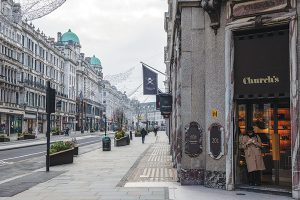Bloomberg
Regent Street, London’s premier shopping thoroughfare, is struggling to shake off the lingering effects of Covid-19.
Store vacancy levels, at a record 12%, are almost twice what they were at the end of 2019, while asking rents for the best space on the street have fallen by more than 30% during the pandemic, according to Savills Plc.
Shoppers who stroll along the curving avenue, passing through Oxford Circus and Piccadilly in London’s West End, may notice the absence of familiar brands. J Crew, Brooks Brothers, Desigual and Zara Home all closed stores during the two years of on-again off-again lockdowns that battered brick-and-mortar retailers and accelerated a shift to online shopping.
“We aren’t out of the woods by any means,†said Simon Harding-Roots, managing director for London at The Crown Estate, which counts Regent Street among its £7.7 billion ($9.5 billion) of holdings in the capital.
The Crown Estate — which traces its roots to the Norman conquest in 1066 — owns a range of assets, from shops, offices and rural lands to the seabed around England. Now an independent company established by an Act of Parliament, its proceeds go to the UK treasury, which in turn sets aside a portion of the profits to fund the monarchy. It owns most of Regent Street along with Norway’s Sovereign Wealth Fund, which has a 25% stake.
The number of visitors to the West End collapsed during the pandemic as shoppers stayed away. Now people are returning, but with many still working part of the week at home, real wages falling and tourism not yet recovered, the shopping district hasn’t bounced all the way back.
Britain’s biggest rail strike in a generation — and the prospect of more labour unrest this summer — aren’t helpful. Nor is the exponential growth of e-commerce companies, like China’s Shein. Even Primark, which has steadfastly resisted moving online, said it will start a trial selling children’s products through its website for in-store collection.
Purveyors of luxury goods have been hit as the government’s decision to abolish tax-free shopping in the UK sends the well-heeled to boutiques in cities like Paris, Madrid and Milan. Those hubs are gaining £5 million a week from high-earning British spenders who can make cheaper purchases on the continent, said Helen Brocklebank, chief executive officer at Walpole, which represents the UK luxury industry.
It’s not just Regent Street where the shine seems to have come off. Vacancies have been rising on neighbouring Oxford Street too, and rents have also fallen. More broadly, the problems affecting London’s prime shopping district are similar to those facing high streets across the UK. Chief among them: surging inflation, a shift to internet shopping and staffing shortages.
Retail leaders need to consider where best to invest money and many will think the digital world is a safer bet, said Peter Williams, the chairman of Mister Spex SE and former chair of Boohoo Group Plc.
 The Gulf Time Newspaper One of the finest business newspapers in the UAE brought to you by our professional writers and editors.
The Gulf Time Newspaper One of the finest business newspapers in the UAE brought to you by our professional writers and editors.
